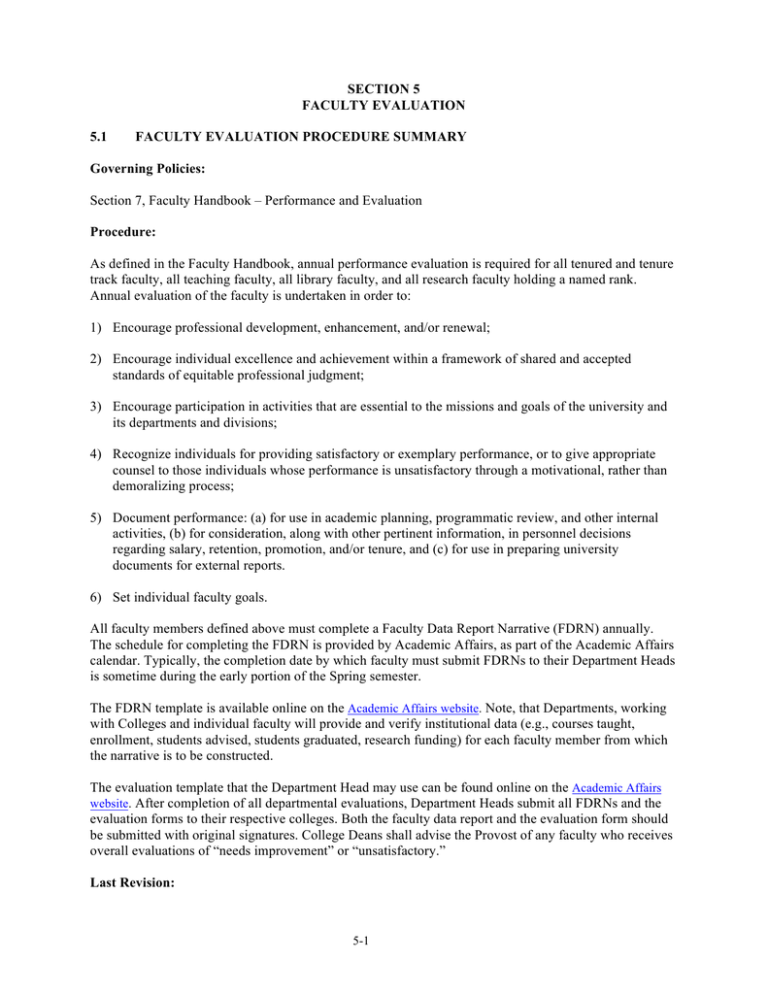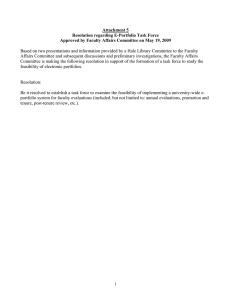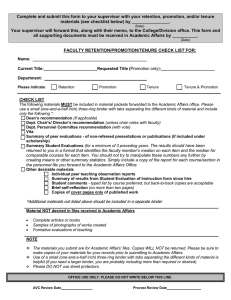SECTION 5 FACULTY EVALUATION 5.1
advertisement

SECTION 5 FACULTY EVALUATION 5.1 FACULTY EVALUATION PROCEDURE SUMMARY Governing Policies: Section 7, Faculty Handbook – Performance and Evaluation Procedure: As defined in the Faculty Handbook, annual performance evaluation is required for all tenured and tenure track faculty, all teaching faculty, all library faculty, and all research faculty holding a named rank. Annual evaluation of the faculty is undertaken in order to: 1) Encourage professional development, enhancement, and/or renewal; 2) Encourage individual excellence and achievement within a framework of shared and accepted standards of equitable professional judgment; 3) Encourage participation in activities that are essential to the missions and goals of the university and its departments and divisions; 4) Recognize individuals for providing satisfactory or exemplary performance, or to give appropriate counsel to those individuals whose performance is unsatisfactory through a motivational, rather than demoralizing process; 5) Document performance: (a) for use in academic planning, programmatic review, and other internal activities, (b) for consideration, along with other pertinent information, in personnel decisions regarding salary, retention, promotion, and/or tenure, and (c) for use in preparing university documents for external reports. 6) Set individual faculty goals. All faculty members defined above must complete a Faculty Data Report Narrative (FDRN) annually. The schedule for completing the FDRN is provided by Academic Affairs, as part of the Academic Affairs calendar. Typically, the completion date by which faculty must submit FDRNs to their Department Heads is sometime during the early portion of the Spring semester. The FDRN template is available online on the Academic Affairs website. Note, that Departments, working with Colleges and individual faculty will provide and verify institutional data (e.g., courses taught, enrollment, students advised, students graduated, research funding) for each faculty member from which the narrative is to be constructed. The evaluation template that the Department Head may use can be found online on the Academic Affairs website. After completion of all departmental evaluations, Department Heads submit all FDRNs and the evaluation forms to their respective colleges. Both the faculty data report and the evaluation form should be submitted with original signatures. College Deans shall advise the Provost of any faculty who receives overall evaluations of “needs improvement” or “unsatisfactory.” Last Revision: 5-1 March 3, 2015 5-2 5.2 SUGGESTED CRITERIA TO BE CONSIDERED FOR FACULTY EVALUATION Teaching • • • • • • • Mastery of fundamentals in discipline Contribution to undergraduate education (teaching and advising) Contribution to graduate education (teaching and advising) Effectiveness of relationship with students Contribution to department/division educational goals Contribution to other educational programs Contribution to curriculum development Scholarship • • • • • • • • • • Breadth of research Mastery of current research methods Creativity and quality of research Effectiveness of graduate student research training Contribution to basic and/or applied research Quality of publications Quantity of publications Efforts to obtain grant and contract support for research Success in obtaining grant and contract support Success in obtaining support for graduate students University and Public Service • • • • • • Contribution to department/division affairs Mentoring of tenure-track faculty, postdoctoral faculty and graduate students Contribution to university affairs Contribution to professional societies Activities with government and/or industry Contribution to public service Other Work-Related Skills and Activities • • • • • • • • Motivation Imagination and creativity Scientific/engineering maturity and self-reliance Responsibility and reliability Ability to make sound professional judgments Ability to express himself/herself orally and in writing Rapport with others Leadership Last Revision: August 7, 2014 5-3 5.3 DEPARTMENT HEAD EVALUATION PROCEDURE SUMMARY The Department Head prepares a Department Head Faculty Data Report and submits same with supporting materials to his/her college Dean by the deadline posted on the Academic Affairs calendar. Typically, these are due by the third Friday in February. The Department Head Faculty Data Report Narrative template is available online on the Academic Affairs website. Prior to the end of the academic year the College Dean reviews the material submitted and evaluates the annual performance of each Department Head in his/her college. The evaluation template that the Dean uses can be found online on the Academic Affairs website. The Dean schedules a meeting with each Department Head to discuss his/her evaluation of the Department Head’s annual performance. College Deans shall advise the Provost of any Department Head who receives overall evaluations of “needs improvement” or “unsatisfactory.” Last Revision: March 3, 2015 5-4 5.4 DEPARTMENT HEAD RESPONSIBILITIES Introduction: The Department Head (DH) provides vision and leadership for his or her unit from a foundation of personal excellence in scholarship and education. The DH has demonstrated ability to represent all disciplines embedded in the unit and to develop cross-disciplinary interactions with internal and external partners. The DH is an advocate for his/her faculty in all matters. The DH is an advocate for the institution and its strategic initiatives, both internally and externally. In addition to maintaining his or her academic activities, as negotiated with the Provost, the DH has administrative responsibilities laid out below. Leadership: o o o o o o o o o o o o o Leads the development of a strategic plan for unit As requested, provides College Dean with departmental annual reports Develops metrics for national comparisons in education and in scholarship Actively seeks opportunities to promote unit and CSM in external environments Actively recruits and retains a world class faculty Actively recruits students from external environments Creates supportive educational environment for all students in unit Encourages and supports strategies to achieve teaching excellence Encourages and supports strategies to achieve research excellence Actively engages with Mines foundation/advancement office in development of funding for chairs, professorships, fellowships, scholarships and infrastructure in the unit Actively engages with the Mines Alumni Association by enriching connections with and exchange of information between alumni and Mines Creates positive relationship with affiliated industries to promote research support and employment for graduates Promotes high ethical values and transparency in decision making Management: o o o o Manages all employees in the unit in a professionally supportive manner: § Reviews faculty (tenure-line, teaching, research) performance each year § Promotes faculty nominations for institutional and national awards § Mentors and enables career development for P&T faculty § Manages Promotion and Tenure process in the division/department § Deploys department/division staff and performs an annual review of each staff member § Schedules courses and deploys faculty and TAs in teaching Budget (General Fund and Discretionary/Foundation): § Has authority and responsibility for central unit funds § Monitors appropriate use of faculty funds including professional development and research accounts Classroom and Teaching Lab facilities: § Develops proposals for institutional funds to support maintenance and improvements Assessment: § Develops and implements appropriate outcome-based assessment tools for undergraduate and graduate education § Prepares annual report for Assessment Committee 5-5 o § Prepares appropriate accreditation documentation § Conducts and analyzes exit interviews for all students Compliance: § Ensures compliance with all institutional policies for faculty and staff (e.g. travel, appropriateness of expenditures, consulting, facilities use etc.) Institutional Participation: o o o o o Actively engages unit faculty in priority institutional and college initiatives: § interdisciplinary research, collaborative cross-institutional activities § interdisciplinary degree programs, joint appointments etc. Actively engages in institutional budgetary and strategic decision making Actively engages unit faculty in institutional recruiting activities Represents and advocates for unit in institutional context Represents and advocates for CSM’s administration with unit faculty and staff Last Revision: June 17, 2014 5-6 5.5 COURSE EVALUATIONS Online student evaluations of faculty effectiveness in teaching are conducted each semester, including the summer terms. Course evaluations are mandatory for all courses with enrollment of five students or more. Only “instructors of record”, those who are formally defined as having responsibility for course delivery are evaluated as part of the course evaluation process. For courses that are team taught, all “instructors of record” are evaluated separately. Formal course evaluations are conducted during the last week of each semester. The Office of Academic affairs will send notifications to instructors and students that evaluations can now be completed. Evaluations are made available via email links or through Blackboard. To ensure high response rates, Faculty are asked to: • Although students can use their computers, tablets, or mobile devices to complete the survey by clicking an appropriate link, to ensure high submission rates it is recommended that faculty allow 10 minutes during class time for completion of the evaluations. Academic Affairs will provide the links for each course to students in a separate email. A module with links to evaluations is also available on the MyMines Tab in Blackboard. • If classroom time is provided, the instructor should leave the room while the students complete the evaluation. Evaluation results are available to Faculty and Academic Departments two days after semester grades are posted by the registrar. In addition to the formal, end-of-semester evaluations, faculty are encouraged to use the Blackboard evaluation system for early and mid-semester feedback. Any evaluation feedback obtained outside of the formal, end-of-semester evaluation, is to be used by the faculty member only, so that he/she may engage in ongoing course improvement efforts. Last Revision: March 9, 2015 5-7 5.6 PROFESSIONAL GROWTH PLANS FOR TENURE-TRACK FACULTY Governing Policies: Section 7.2.1, Faculty Handbook – Professional Growth Plans for Newly Appointed Faculty Section 8.1.4, Faculty Handbook – Preliminary Tenure Review Procedure: All tenure-track faculty are required to prepare a Professional Growth Plan (PGP) during the first semester of employment at Mines. The plan should be developed in consultation with the faculty member’s Department Head, and at minimum cover the period of the probationary appointment up to the Preliminary Tenure Review (PTR). PGPs are reviewed as part of any faculty evaluation, including the PTR. As such, the PGP constitutes an early step in the promotion and tenure process. Professional Growth Plans need not be voluminous. They should, however, be broadly modeled to parallel the content and section format of the Faculty Data Report Narrative (FDRN). That is, the PGP should include major sections titled Teaching, Scholarship and Service. The content addressed in each these sections should relate to the subcategories defined in each section, such that it is clear that by successful implementing the PGP will naturally lead to strong performance evaluations as measured by the FDRN and ultimately a strong indication of successful tenure application as provided by the PTR process. The PGP should be transmitted to the Department Head by the deadline provided by the Academic Affairs calendar. The Department Head shall review the plan, and if necessary meet with the faculty member to discuss and modify the proposed plan. Once approved by the Department Head, the plan shall be transmitted to the appropriate College Dean. Upon review by the Dean, the PGP shall be forwarded to AA and filed in the individual’s personnel file. Last Revision: June 17, 2014 5-8


